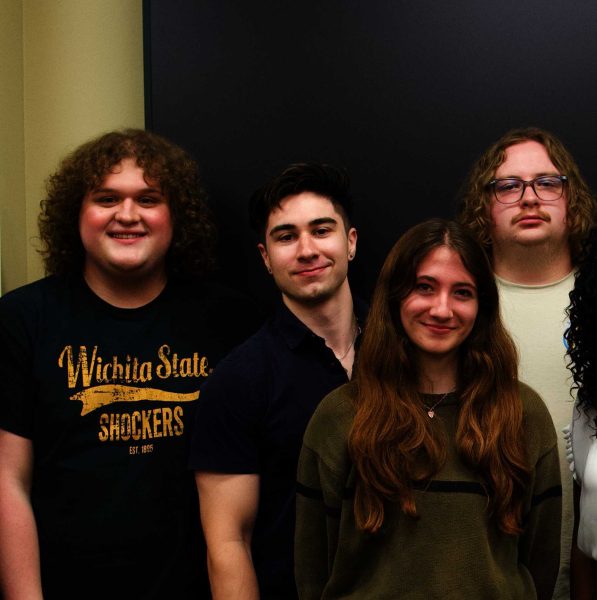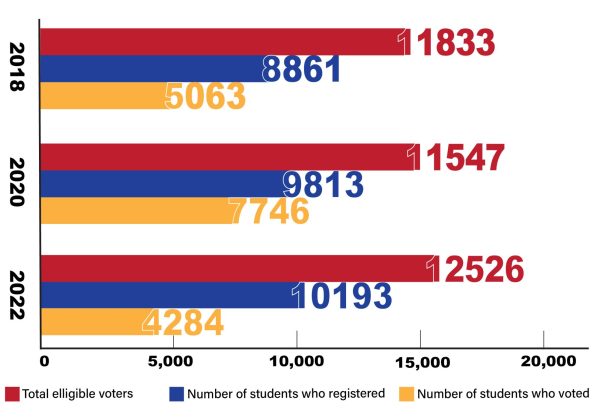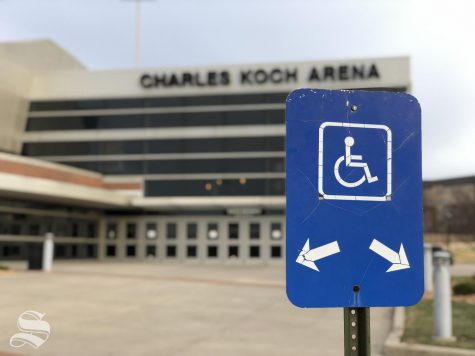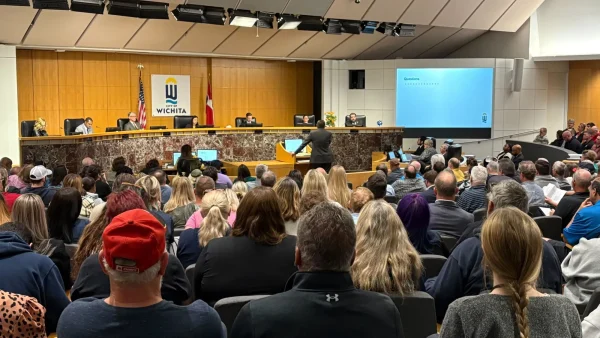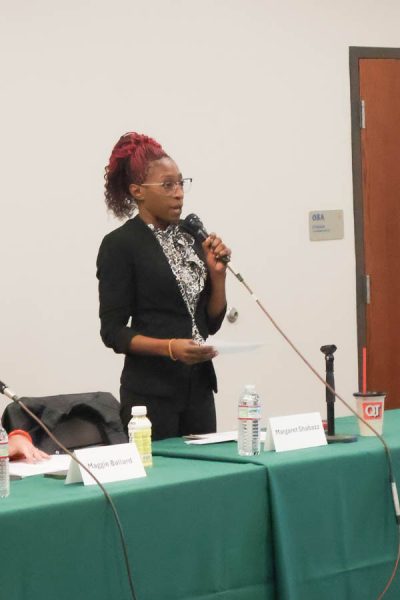Q&A with President Bardo
For the first time since April 2017, WSU President John Bardo had a sit-down interview with The Sunflower Monday.
File photo – President John Bardo
A president’s job is to look to the future, Bardo said. The responsibility of handling the here and now is largely for vice presidents.
Bardo said this and many other things Monday in an hour-long interview with The Sunflower. Vice President for Strategic Communications Lou Heldman accompanied Bardo during the interview. Bardo was asked about innovation, The Sunflower, badge courses, a campus YMCA, and other topics that The Sunflower hadn’t been able to ask him directly about before.
Responses have been edited for length and clarity.
Do you read The Sunflower?
Bardo: Not really. I don’t think I want to talk about The Sunflower. You’re an independent student newspaper, and I think you need to stay that way.
Heldman: Not really.
Can we at least talk about the $25,000 in advertising Student Affairs put forward as a way of supplementing The Sunflower’s cut budget?
Bardo: That’s pretty straightforward. I had no intent to cut the student newspaper’s budget — that’s not my interest. It’s not unusual for universities to buy advertising in the student newspaper, so when Teri (Teri Hall, Vice President of Student Affairs) suggested to me that that could be a good solution and to not have to overrule students, I think it is a good solution. It’s one that is pretty typical and normal, and, you know, happens regularly, so you know, why not?
My intent wasn’t to cut anything. So let’s not undo student government, but let’s do what we need to do.
There was talk of our funding being restored down the road, when more funding potentially becomes available.
Bardo: You know, that’s going to come out of student government.
I’ve been trying to keep this as an independent paper, and so I haven’t really got involved in any of that. So it’s really a conscious … if you’re going to be independent, be independent.
Do you support what The Sunflower does as a whole?
Bardo: I think it’s important we have student media.
Do you see Wichita State as your legacy school?
Bardo: I’ve been connected with WSU since I was 24 years old, in one way or another. So I’m not going anywhere. This is home. And, you know, I’m trying to put the university in a position to be successful where a lot of universities aren’t going to be.
Do you see yourself as president a few years from now?
Bardo: I don’t know. You tell me. I see myself trying to continue to move the university forward.
Where do you see WSU 10 years from now?
Bardo: I’ve been watching this for about 20 years now, and have seen this movement. And so I anticipate that 10 years from now, we’re going to be quite different than we are now. We’re still going to have residential students. We’re still going to have full-time students. But we’re also going to have a lot of people who are taking courses in ways we can’t even think about right now.
Like I said, the technology of how you teach, the information we have on brain science cognition is changing so fast. Let’s say you’re someone your age who’s living on campus or a full time student. You may be taking two courses on campus, two courses via artificial intelligence programming — who knows, it’s just going to be very different.
Why has WSU put such an emphasis on badge courses over the last year?
Bardo: Badge courses really aren’t any different from any other course. They’re just shorter. One of the things we’re proposing to the Regents (Kansas Board of Regents) in September is that they allow us to offer badge courses to degree-seeking students as well . . . Instead of a transaction with a student, you create a lifelong relationship with that student.
Do you ever get tired of the word ‘innovation?’
Bardo: I can’t imagine every running for governor or president. Can you imagine giving the same speech 10 or 12 times a day and you have to act like you’re so excited each time? For most people, they pay attention to something when it affects them. So you have to keep saying the same things with the assumption that the person you’re talking to hasn’t heard it yet.
You and your administration have received criticism for what some see as decisions made without input from stakeholders and those affected by these decisions — for example, teachers and staff that felt overstepped when it came to announcing a Koch-funded Wonder school, or students that felt forced to pay for a new YMCA through student fees. What can you say about that?
Bardo: Oh, you know, we’re in a time of massive change. We’re going to try to continue to expand our capacities to hear people — uh, we’ve been doing more of that, I think you’ve seen that this year. One of the things in times of change, as you know, it’s difficult. It’s just simply difficult. We’re going to keep working at trying to do better at it.
So you’d say everyone has been given input?
Bardo: Would they say they’ve been given input, oh heavens no. Because that’s 100 percent of the time that you’ll hear that. Are we trying to find ways of doing that? Yes. Did we miss anybody? I have no way of knowing that. But we’re going to keep trying to expand it and keep trying to move forward with giving people opportunities to say what they need to say. And we’ll take into consideration what they need to say.
You’ve previously said you don’t want students to foot the bill for a football program, and wouldn’t move forward with football unless there was investment, but what about something like the YMCA that’s coming to campus?
(Editor’s note: The 59th Session of Student Government voted against a YMCA proposal that would affect student fees in spring 2017. Once the 60th Session began, administration approached the new executive team and had the YMCA reproposed, where it was then approved with a different student fees structure.)
Bardo: There’s a really big difference there (between football and the YMCA). It’s easy when you live on a campus to say, ‘This is us, this is only going on here.’ It’s not. This is pretty much going on around the United States. The question is, how do you offer services that students need while at the same time preserving your capital, right?
Right now, to offer the services that are demanded and needed, you’re going to do a lot more of these public-private partnerships over time. It’s going to be the future of higher education. It’s not unique to Wichita State in any way.
A lot of what we’re doing here, people say ‘Oh my gosh, that’s just radical!’ And it’s like, well, some of the stuff.
So is Wichita State ahead of the curve on embracing these things?
Bardo: No, no, no. Not even close. What’s so funny to me, when I hear about the Innovation Campus, the first corporation that created something like the Innovation Campus was done two years before I was born. It’s new for around here, but it’s not even close to new. The public-private partnerships, there are hundreds of those out there in all kinds of public entities. So it’s ‘Oh my gosh, this must be,’ … We try to keep it all in house so whoever is president ten years from now can say this is where we want to take this.
Heldman: It’s not that what we’re doing is innovative. It’s that we’re trying we’re trying to spur innovation in our students, faculty and staff so it’s a place for innovation, not a name.
Bardo: We aren’t doing anything different than we’ve ever done. All of a sudden people go, ‘Woah, you’re doing that,’ but it’s nothing different than what has been traditional. I don’t think anything has changed since I’ve been here, to the best of my knowledge.
The badges are a mechanism to get us in the game. They’re a mechanism, just one, and I have no ideas what the others will look like, but they will be there, and there will be a number of them.
Why don’t other KBOR universities count lifelong learning courses toward enrollment?
Bardo: Others offer them, sure they do.
(But they don’t count as credit, correct?)
Heldman: You may be hanging your hat on one short quote from Pat Bosco at K-State (Editor’s note: K-State Vice President for Student Life Pat Bosco is quoted in an October 2017 issue of The Sunflower as saying ‘It’s not how we do business at K-State,’ in regard to counting their badge course-equivalents towards enrollment) and when Dr. Bardo and I were at the Regents meeting last week, one of the things they were talking about is how K-State has really suffered in enrollment. It’s been the hardest hit institution. And the president of K-State was talking about how they need to bring their enrollment practices into modern times. And so, if you’re using that example as what you think stands on a pedestal, I’m telling you, K-State itself doesn’t think it stands on a pedestal when it comes to enrollment practices.
Maybe what you’re doing is you’re thinking that one final enrollment on the 20th day of fall represents all virtue in university practices, and if you look across higher education in the United States, enrollment has been really heading down for years.
Going back to the YMCA — what if the SGA 60th Session hadn’t voted yes on the Y?
Bardo: I have no way of knowing. I have no way of knowing. They did (approve it), we move forward. I’m not good with hypotheticals, because I just don’t know how to answer.
Heldman then encouraged The Sunflower to seek out the stories of innovative students, rather than focusing on student government and the administration.
Heldman: You know student government is going to meet at a certain time and you can be there. And you know that the administration is going to do a certain number of things you can criticize and you can focus on and you can be there. But capturing the actual experiences of being a student at Wichita State …
(We’re really excited for our culture section this year.)
Heldman: Oh, that’s great. I don’t know anything about it. That’s neat.
Bardo: I want you to be independent. Whatever you all do is fine at the end of the day.
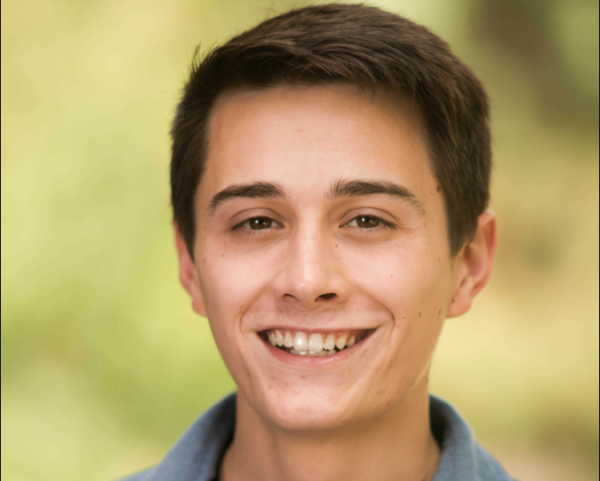
Andrew Linnabary was the 2018-2019 Digital Managing Editor of The Sunflower. He studied journalism and minored in English. Linnabary is from Wichita, Kansas.

Matthew Kelly is a former editor-in-chief and managing editor for The Sunflower. Kelly graduated in 2020 with a bachelor’s degree in political science...




